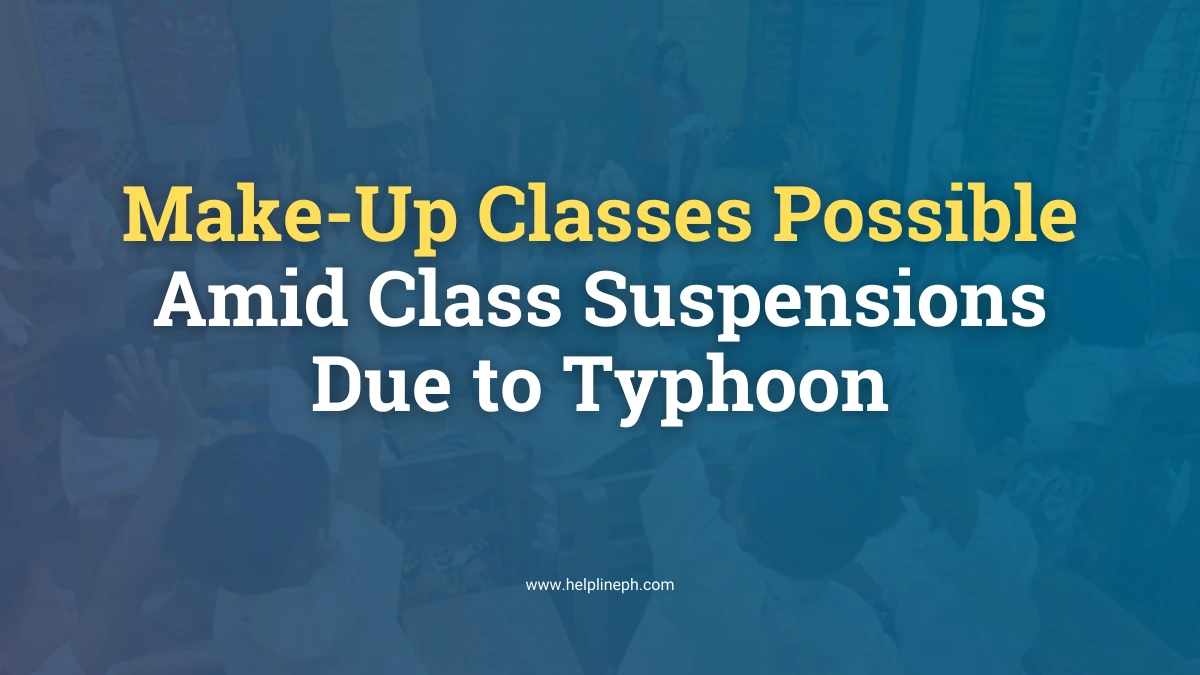The Department of Education (DepEd) in the Philippines is closely evaluating the number of school days missed due to recent typhoons, especially Severe Tropical Storm Kristine. This storm has caused widespread class suspensions across the country, affecting millions of students. DepEd aims to assess the impact of these cancellations and create solutions that ensure students can recover the lost days of learning.
Typhoons and Learning Interruptions: A Growing Concern
In a recent interview, Education Secretary Sonny Angara expressed alarm about how frequently classes have been canceled due to typhoons. The Department is now collecting data on the total number of missed school days to see if there are enough available dates for make-up classes.
Secretary Angara explained the Department’s urgent concern: “We are worried that if students miss too many school days, they may find it hard to catch up with their lessons.” He highlighted that the goal is to ensure every student has the opportunity to complete the required curriculum for the school year.
Statistics Show the Scale of Disruption
As of the latest DepEd data, approximately 37,375 schools across the Philippines have suspended classes due to Tropical Storm Kristine. The number of affected students has reached over 19 million. With typhoons becoming more common, it has become clear that traditional school calendars are increasingly disrupted, making learning continuity a critical issue for DepEd.
Ensuring Continued Learning During Typhoons
To avoid significant learning gaps, Secretary Angara emphasized that students should not be idle even when classes are suspended due to storms. According to him, “As typhoons are getting more frequent, it’s essential to find ways for students to continue learning at home, as much as possible.”
With this in mind, DepEd is now exploring various methods to make up for the missed days of school, including:
- Saturday Make-Up Classes
- Blended Learning Options
- Localized Solutions for Each School
Possible Solutions to Make Up for Missed School Days
1. Saturday Make-Up Classes
One possible solution is to hold classes on Saturdays. This allows students to gradually catch up without overloading them with too many extra days at once. However, Secretary Angara stressed that this will depend on each school’s capacity, as well as the schedule and availability of teachers and principals.
School officials will have the flexibility to decide if and when Saturday classes should occur based on their own needs and resources. This ensures that schools are not forced into a one-size-fits-all solution, which is important since each school faces different challenges.
2. Blended Learning for Senior High Students
DepEd is also considering blended learning options, especially for Senior High School students. Blended learning combines in-person, online, and modular methods to offer students more flexibility in their studies. Secretary Angara believes this approach could be effective, particularly for students who have internet access and can complete some of their coursework online.
This option aims to provide a hybrid model, where Senior High School students can participate in a mix of in-person and virtual classes. This approach helps balance the need for direct teacher interaction with independent study, allowing students to continue learning even when they cannot physically attend school.
Customized Approaches for Each School
DepEd is allowing schools to adapt these solutions based on their resources. For example, schools in areas with limited internet connectivity may not be able to implement a full blended learning model but could try other methods, such as modular learning, where students receive printed materials to study at home.
The Importance of Immediate Interventions
With increasing weather disruptions, DepEd recognizes the urgent need to implement solutions promptly. The Department is now fast-tracking its analysis of missed school days and the number of possible make-up sessions. If they delay implementing solutions, the risk of students falling behind becomes greater, leading to potential long-term consequences in their education.
Conclusion
The Department of Education’s response to frequent class suspensions due to typhoons demonstrates its commitment to ensuring educational continuity despite environmental challenges. By implementing solutions like Saturday classes, blended learning, and school-specific plans, DepEd aims to prevent learning loss for millions of students. The Department’s focus remains on giving each student a fair opportunity to succeed academically, even when faced with unavoidable disruptions.
Frequently Asked Questions (FAQs)
Why is DepEd worried about class suspensions?
DepEd is concerned that frequent suspensions due to typhoons could lead to significant learning gaps for students. Too many missed days might make it difficult for students to complete the required curriculum.
What solutions is DepEd considering for missed school days?
DepEd is considering Saturday make-up classes, blended learning (a mix of online, in-person, and modular learning), and customized plans for each school depending on their resources and needs.
How does blended learning work?
Blended learning combines different methods of instruction, such as online classes, in-person learning, and modular activities. This allows students to continue their studies even if they cannot attend school physically.
Who will decide if Saturday classes are needed?
Each school’s principal and teachers will have the flexibility to decide if Saturday classes are appropriate based on their own schedules and capacity.
By assessing the number of missed school days and developing alternative learning solutions, DepEd aims to minimize disruptions to student learning.






